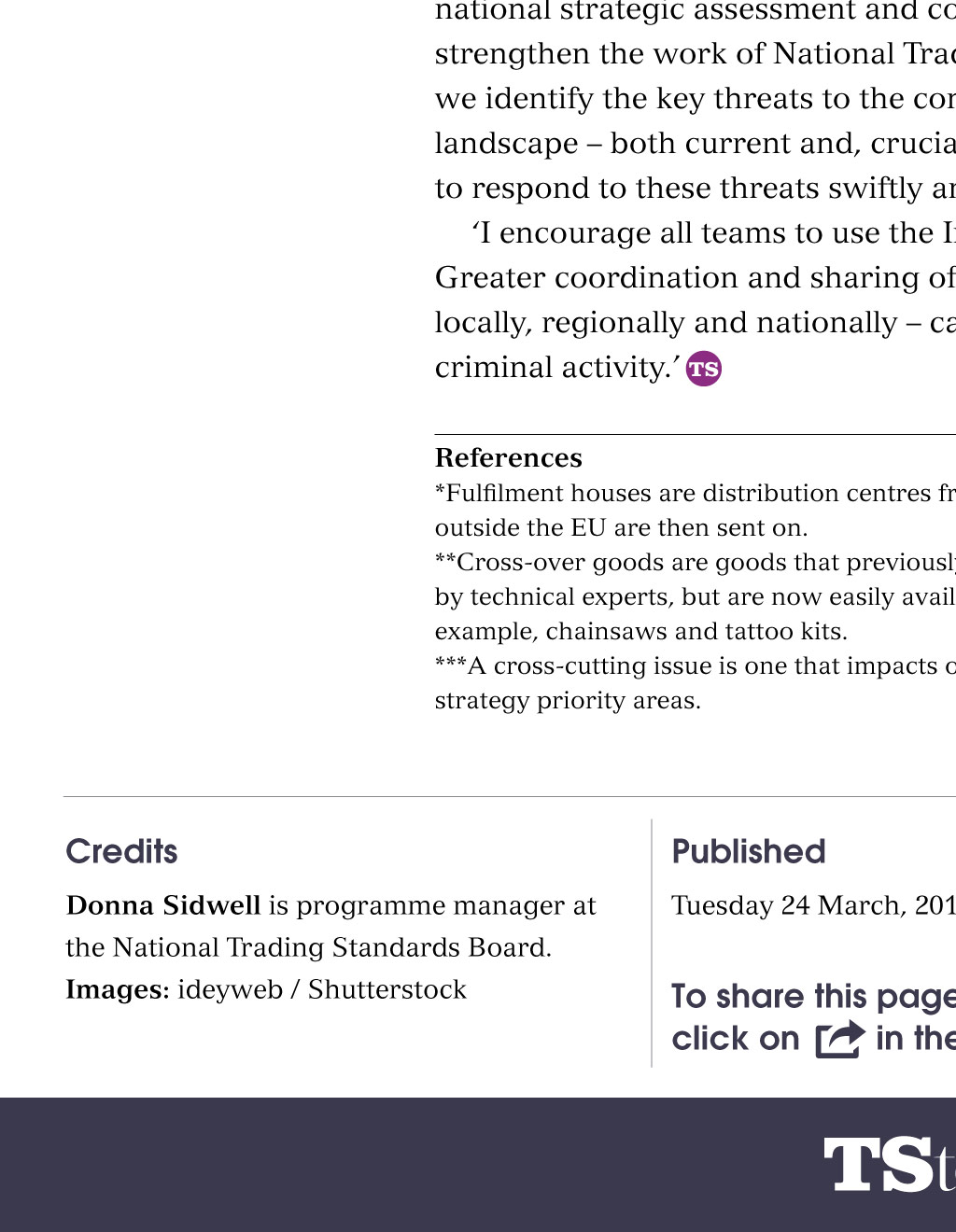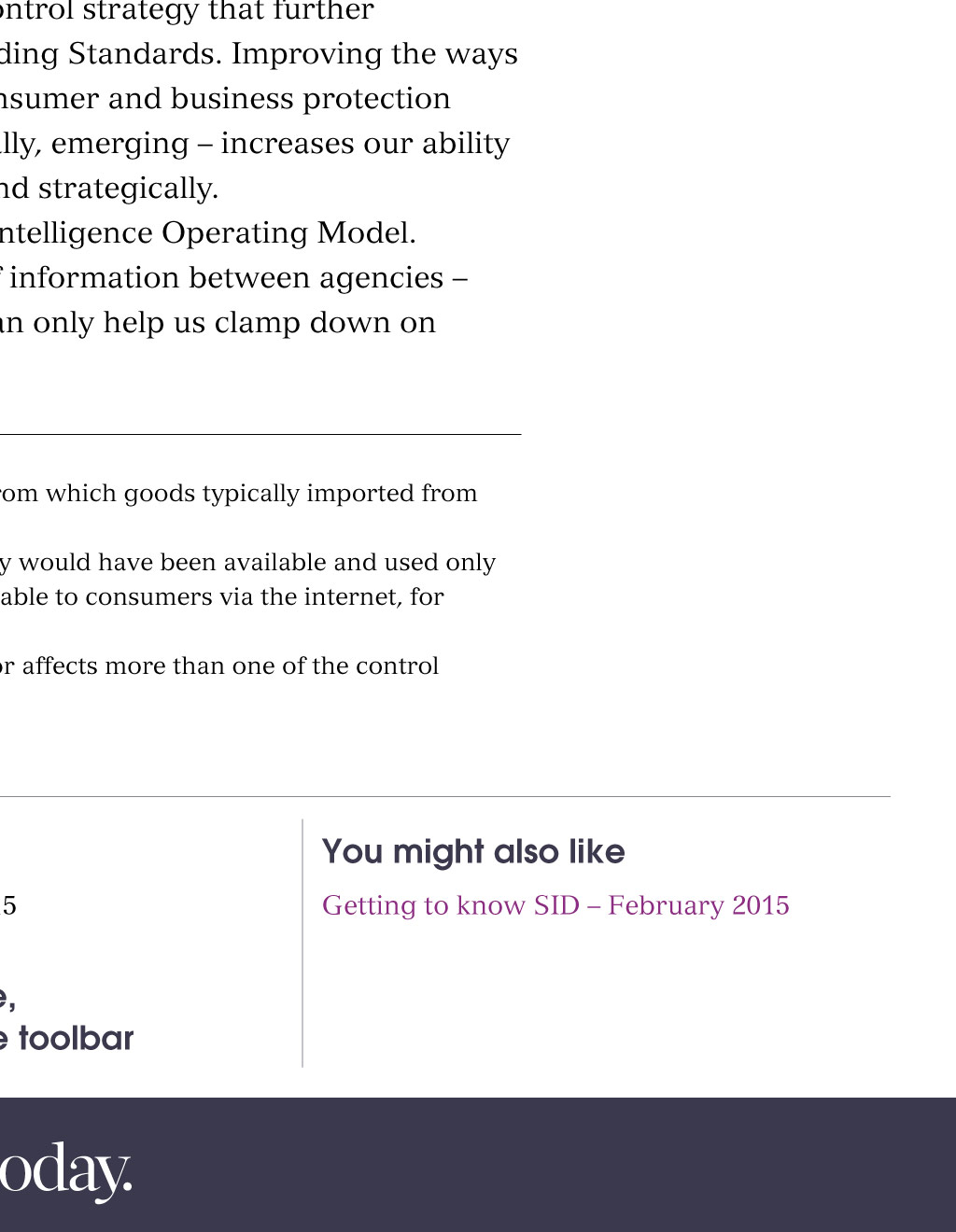
























Sponsored feature National Trading Standards Board A mine of information The National Strategic Assessment and National Control Strategy reveal the internet is the platform of choice for scam artists, and other key threats. Donna Sidwell explains N ational Trading Standards is committed to improvement and will continue to lead the new enforcement agenda and implement better intelligence systems locally, regionally and nationally. It is crucial to be able to identify areas where there is a need for action at an early stage, so that priorities can be established and resources allocated to deal with the issues. To assist this process, National Trading Standards adopted a national strategic assessment for 2015-16, produced by the National Trading Standards Intelligence Team (NTS Intelligence Team). This provides an overview of the current and long-term issues and problems affecting, or likely to affect, the consumer and business protection landscape in England and Wales. Numerous data sources have been used, drawn from 1 September 2013 to 31 August 2014. Business planning The national strategic assessment is an integral part of National Trading Standards business planning process and is used to take decisions and make recommendations on how to tackle problems effectively, and develop national policies. It identifies the key problems, emerging issues and priority areas for prevention, intelligence and enforcement activities that have been considered for inclusion in the national control strategy for 2015-16. Both the strategic assessment and control strategy take account of the Consumer Protection Partnerships strategic assessment and priorities, as well as local and regional priorities. As trading standards areas of work are very broad, not all areas could be covered in the strategic assessment, so the NTS Intelligence Team adopted criteria focusing on those areas where: G The area of work is a current national control strategy priority, or an agreed area of work for National Trading Standards G Intelligence submissions indicate that a significant degree of work is being undertaken in that area by trading standards (that is, anything more than three per cent) G It is a potential threat or issue raised by area experts, regional intelligence analysts or horizon scanning The table below highlights the key threats and emerging issues identified in the strategic assessment: Category Key threats Emerging issues Doorstep crime G Green Deal initiative scam traders G Scam builders Organised Crime Groups (OCGs) targeting vulnerable persons G e-crime G Internet as the platform of choice for scam traders G Internet OCGs, causing millions of pounds of detriment in months G Subscription trap websites G Fair trading and scams G National companies in the top 10 traders year after year G Second-hand car dealers G Internet-based scams, such as subscription traps G Mass-marketing postal scams G Intellectual property offences G Dangerous counterfeit goods being sold online G Links to international organised crime groups G Product safety G Unsafe goods being imported from China G Fulfilment houses* G Unsafe fire-retardant furniture It is crucial to be able to identify areas where there is a need for action at an early stage, so that priorities can be established and resources allocated to deal with the issues G More scams linked to government home improvement loans G Compulsory smart meters by 2020 (longerterm threat) Increase in scam loans websites G Selling of illicit/ counterfeit goods via internet social media Internet-based scam loan companies G Fair trading issues with online and app-based games G Increase in postal massmarketing scams Counterfeit tobacco being sold at retailers and online G Use of social media as trading platform for counterfeit goods Increased ease for private sellers to import and sell goods G Increased sale of crossover goods** G Increased sale of potentially dangerous counterfeit tobacco The strategic assessment shows that the internet is a platform of choice for rogue traders and a cross-cutting issue***. Therefore, National Trading Standards felt it would be more helpful, when the next annual national strategic assessment and control strategy are produced, if e-crime was embedded across all the key priority areas of work, rather than remain a stand-alone priority area. A number of trading standards areas of work, which fall outside the current scope of National Trading Standards but link to priority areas locally, such as animal health, food fraud and illegal tobacco, are also briey covered in the control strategy. Actions It is envisaged that the national strategic assessment and control strategy will help link work done by local trading standards services to that being done regionally and nationally The control strategy informs and directs the work of National Trading Standards via its teams and other projects. The activities laid out in the plan will be undertaken directly or funded by National Trading Standards. The control strategy may be reviewed and amended by National Trading Standards, but will operate from April 2015 to March 2016. Detailed oversight and performance monitoring of the actions are provided by the National Trading Standards Governance Groups, for the work of the National Trading Standards teams, and expert group/ panel meetings will be reported via the quarterly reports prepared on all National Trading Standards activities. Local authority trading standards services will continue to address local threats and those issues under local political control. It is envisaged that the national strategic assessment and control strategy will help link work done by local trading standards services to that being done regionally and nationally. However, they are not designed to require local authorities or regional trading standards groups to undertake any activities at a local or regional level. These remain entirely matters for local authority service planning in accordance with local priorities, or regional trading standards groups business planning in accordance with regional priorities. Intelligence Operating Model National Trading Standards developed the Intelligence Operating Model to provide an intelligence framework to support trading standards locally, regionally and nationally. All trading standards services are encouraged to record intelligence on databases to improve tactical and strategic assessments and improve the links and access to intelligence held by other agencies. There will also be horizon scanning to identify and intervene quickly on emerging consumer issues. Regional tasking groups can refer matters that are of national importance to the National Tasking Group (NTG) for consideration the Competition and Markets Authority is an observer on the NTG. National Trading Standards will continue to improve coordination between national, regional and local teams to deal effectively with national consumer protection issues. It will also encourage the use of proceeds of crime and asset recovery opportunities to ensure the scope of criminality is identified, to act as a deterrent and to reinvest any incentivisation money to further enforcement or prevention activities. It will work with the Consumer Protection Partnership, the Local Government Association, Welsh Local Government Association, Department for Business, Innovation and Skills, the Welsh Assembly and other government departments/agencies to help support the work of trading standards services. Information sharing Each year, National Trading Standards has agreed that the full strategic assessment will be circulated, with appropriate security markings and by secure email, to all local authority trading standards services. The strategic assessment foreword, executive summary and the control strategy will be drafted with no sensitive information, so that it can be shared with partners and placed on the website. Lord Toby Harris, chairman of National Trading Standards, said: I congratulate and thank all those involved in formulating our new national strategic assessment and control strategy that further strengthen the work of National Trading Standards. Improving the ways we identify the key threats to the consumer and business protection landscape both current and, crucially, emerging increases our ability to respond to these threats swiftly and strategically. I encourage all teams to use the Intelligence Operating Model. Greater coordination and sharing of information between agencies locally, regionally and nationally can only help us clamp down on criminal activity. References *Fulfilment houses are distribution centres from which goods typically imported from outside the EU are then sent on. **Cross-over goods are goods that previously would have been available and used only by technical experts, but are now easily available to consumers via the internet, for example, chainsaws and tattoo kits. ***A cross-cutting issue is one that impacts or affects more than one of the control strategy priority areas. Credits Published You might also like Donna Sidwell is programme manager at Tuesday 24 March, 2015 Getting to know SID February 2015 the National Trading Standards Board. Images: ideyweb / Shutterstock To share this page, click on in the toolbar "